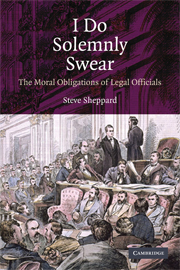Book contents
- Frontmatter
- Contents
- Preface: Moral Officials, Retail Justice, and Three Caveats
- Acknowledgments
- Introduction: Seven Questions about What Is Fit for an Official to Do
- 1 Law and Office
- 2 The Stakes: The Interests of Others in Official Actions
- 3 Officials' Obligations Arise from More Than the Law Alone
- 4 The Moral Obligations of Legal Officials
- 5 Patterns of Relationship between Legal and Moral Obligations
- 6 Breaching Obligations
- 7 Tools for the Trade: Maxims and Fallacies
- Epilogue: What the Official Ought to Do: Law and Justice
- Appendix: Taxonomy of Headings: The Lawes and Libertyes of Massachusetts (Discussed in Chapter 1)
- Index
- References
1 - Law and Office
Published online by Cambridge University Press: 05 June 2012
- Frontmatter
- Contents
- Preface: Moral Officials, Retail Justice, and Three Caveats
- Acknowledgments
- Introduction: Seven Questions about What Is Fit for an Official to Do
- 1 Law and Office
- 2 The Stakes: The Interests of Others in Official Actions
- 3 Officials' Obligations Arise from More Than the Law Alone
- 4 The Moral Obligations of Legal Officials
- 5 Patterns of Relationship between Legal and Moral Obligations
- 6 Breaching Obligations
- 7 Tools for the Trade: Maxims and Fallacies
- Epilogue: What the Official Ought to Do: Law and Justice
- Appendix: Taxonomy of Headings: The Lawes and Libertyes of Massachusetts (Discussed in Chapter 1)
- Index
- References
Summary
The administration of the government, like the office of a trustee, must be conducted for the benefit of those entrusted to one's care, not of those to whom it is entrusted.
Cicero, On Duties, Book I, Chapter XXVAt the outset, we must deal with two fundamental questions: what is the law, and what are officials? We must have a common understanding of the law and the people who work with it, if we are to consider what implications there are for us, and for them, in what they do. Thus, we must consider what we imagine when we think of laws and officials.
There is a tension between two visions of the law in America, and these views of law color our view of the official. On the one hand, we see the law as a Romantic ideal. Two lawyers stand like gladiators, each fighting for a cause before a judge who decrees a winner and a loser. A president or a senator stands like a Roman of old, pronouncing the law. In each picture, the individual appears as the source of the law, the person acting upon the law and the law acting through the person. Yet we also see a classical ideal, our laws framed and shaped by famous institutions in vast marble buildings, great armies of experts in which the efforts of each individual are only a portion of the whole.
- Type
- Chapter
- Information
- I Do Solemnly SwearThe Moral Obligations of Legal Officials, pp. 8 - 48Publisher: Cambridge University PressPrint publication year: 2009

